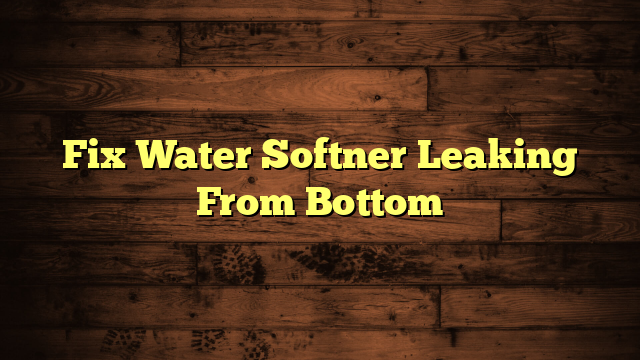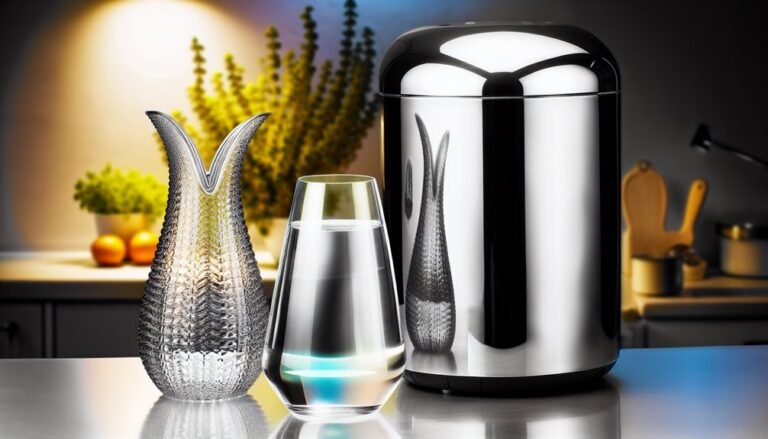Do I Need a Carbon Filter With My Water Softner?
Did you know that while a water softener tackles hard water issues, it can't filter out harmful contaminants like chlorine or heavy metals? You might think that soft water is all you need, but without a carbon filter, you're missing out on improved water quality that could greatly benefit your household. Understanding how these systems work together is essential for making informed decisions about your water treatment options. So, is a carbon filter really necessary, or can your water softener stand alone?
Key Takeaways
- A water softener removes calcium and magnesium, but does not address chlorine or other impurities in the water.
- If your municipal water contains chlorine or has unpleasant tastes, a carbon filter is beneficial.
- Carbon filters enhance overall water quality by removing odors, heavy metals, and volatile organic compounds (VOCs).
- For well water with minimal sediment, a carbon filter may not be necessary alongside a water softener.
- Using both systems together can provide comprehensive water treatment for improved taste and reduced hardness.
Understanding Water Softeners
When it comes to water treatment, many people often find themselves asking about water softeners. These systems play an essential role in enhancing water quality for your home.
Fundamentally, a water softener works by removing minerals like calcium and magnesium, which cause hard water. Hard water can lead to issues such as scale buildup in your pipes and appliances, reducing their efficiency and lifespan. By softening your water, you're not only improving household efficiency but also ensuring that your plumbing stays in good shape.
You'll notice benefits like cleaner dishes and softer laundry, making daily chores more manageable. Moreover, using a water softener can extend the life of your water heater, which saves you money in the long run.
However, it's important to take into account your specific needs. If your water supply has high levels of contaminants, you might also need extra filtration methods.
Understanding how water softeners function can empower you to make informed decisions about your water treatment options. Ultimately, the right system can greatly enhance your home's water quality, making every drop count.
What Is a Carbon Filter?
A carbon filter is an essential component in water purification systems, designed to improve water quality by removing impurities. These filters use activated carbon, which has a large surface area that effectively adsorbs contaminants.
When you install a carbon filter, you're taking a significant step toward ensuring your water is clean and safe to drink.
There are several carbon filter types you might encounter, including:
- Granular Activated Carbon (GAC): Typically used for larger systems, great for general contaminants.
- Carbon Block Filters: More compact and effective at removing particulates and chemicals.
- Catalytic Carbon Filters: Excellent for removing chlorine and chloramines.
- Carbon Fiber Filters: Flexible and efficient for various applications, often used in smaller setups.
Each type has its own filter lifespan, usually ranging from a few months to a couple of years, depending on usage and water quality.
Regular maintenance is vital, as a used-up filter can become less effective and may even release impurities back into the water.
Understanding the different carbon filter types and their lifespans can help you choose the right option for your water purification needs.
Benefits of a Carbon Filter
Why consider adding a carbon filter to your water softener? A carbon filter can greatly enhance your water quality, providing several carbon filter advantages that make it a worthy investment. First off, it helps remove chlorine and other contaminants, leading to improved water taste. You'll notice a difference in how your water smells and tastes, making it more enjoyable for drinking and cooking.
Here's a quick overview of the benefits:
| Carbon Filter Advantages | Details |
|---|---|
| Enhanced Taste | Removes chlorine, odors |
| Contaminant Removal | Filters out heavy metals |
| Improved Clarity | Reduces cloudiness |
| Better Health | Decreases harmful substances |
| Cost-Effective | Reduces bottled water need |
With a carbon filter, you're not just softening your water; you're also ensuring it's clean and invigorating. Whether for drinking, cooking, or bathing, filtered water can improve your overall well-being. By adding this simple component, you can enjoy the dual benefits of soft, great-tasting water. So, consider how a carbon filter can elevate your water experience!
How Water Softeners Work
Water softeners work primarily through a process called ion exchange, where hard water minerals like calcium and magnesium are swapped for sodium ions.
This process helps prevent scale buildup in your plumbing and appliances, making water feel softer and more pleasant to use.
Moreover, water softeners go through a regeneration cycle to clean the resin beads, ensuring they continue to function effectively over time.
Ion Exchange Process
How does the ion exchange process work in a water softener? It's quite fascinating! This process is the heart of how water softeners operate, helping to reduce hard water minerals that can cause issues in your home.
Here's a quick breakdown of the ion exchange method used in the softening process:
- Resin Beads: Your softener contains resin beads coated with sodium ions. These beads are key players in the softening process.
- Hard Water Influx: When hard water enters the softener, the calcium and magnesium ions in the water are attracted to the resin beads, displacing the sodium ions.
- Ion Exchange: As the hard minerals attach to the resin, sodium ions are released back into the water, effectively softening it.
- Regeneration Cycle: Eventually, the resin beads become saturated with hard minerals. During regeneration, a saline solution flushes the beads, restoring their sodium coating for future use.
Hard Water Minerals
Hard water contains high levels of minerals like calcium and magnesium, which can lead to various issues in your home, from mineral buildup in pipes to spots on dishes.
These hard water effects don't just stop at unsightly surfaces; they can also impact your plumbing and appliances. Over time, the accumulation of minerals can restrict water flow in pipes, reducing efficiency and potentially leading to costly repairs.
When you use water containing these minerals, you may notice that soap doesn't lather well, and laundry can feel stiff. This is a result of the way minerals interact with soap, making it less effective.
Furthermore, you might find yourself constantly scrubbing surfaces to remove mineral deposits, which can be frustrating and time-consuming.
Regeneration Cycle Explained
A water softener operates through a process called regeneration, which typically occurs every few days or after a certain volume of water has been treated.
This vital process helps remove the accumulated hardness minerals from the resin beads, allowing your system to function effectively. Understanding the regeneration cycle is essential for ideal performance.
Here are four key aspects of the regeneration cycle:
- Regeneration Frequency: This can vary based on your water usage and the hardness level of your water. Most systems regenerate every 3 to 7 days.
- Salt Dosage: The amount of salt used during regeneration affects how effectively the resin beads are cleaned. Make sure to follow the manufacturer's recommendations for the right dosage.
- Brine Solution: During regeneration, a concentrated brine solution flows through the resin tank, displacing the hardness minerals.
- Rinsing: After the brine process, the system rinses the resin beads to remove excess salt, preparing it for the next cycle.
When to Use a Carbon Filter
Knowing when to use a carbon filter can greatly enhance the quality of your water. If your water source contains contaminants like chlorine, volatile organic compounds (VOCs), or unpleasant odors, a carbon filter becomes essential. These filters come in various types, including activated carbon filters and carbon block filters, each designed to target specific impurities.
To help you decide when to use a carbon filter, reflect on the following scenarios:
| Scenario | Carbon Filter Needed? |
|---|---|
| Municipal water with chlorine | Yes |
| Well water with sediment | Not necessarily |
| Water with odors or tastes | Yes |
| High levels of VOCs | Yes |
Using a carbon filter can greatly improve your water quality by removing harmful substances and enhancing taste. If you notice any of the issues mentioned, it's time to reflect on adding a carbon filter to your existing water treatment system. By understanding the right carbon filter types for your needs, you can enjoy cleaner, fresher water in your home.
Comparing Water Quality Outcomes
When evaluating water quality outcomes, it's essential to reflect on how different filtration systems—like carbon filters and water softeners—affect your water. Each system addresses specific issues, and understanding these differences can help you make an informed decision.
- Water Quality: A carbon filter excels at removing chlorine, bad tastes, and odors, enhancing overall water quality. In contrast, a water softener primarily targets hard minerals like calcium and magnesium, which can lead to scale buildup.
- Mineral Content: Water softeners replace hard minerals with sodium, which can alter the mineral content of your water. This can be beneficial for plumbing but mightn't suit everyone's dietary needs.
- Health Considerations: If you're concerned about contaminants, a carbon filter can provide an extra layer of protection, especially in areas with pollution or aging infrastructure.
- Taste and Smell: If you notice unpleasant tastes or smells in your water, a carbon filter may greatly improve your drinking experience, while a softener alone mightn't address these issues.
Installation Considerations
When you're planning to install a water softener, you'll need to think about a few key factors.
First, consider the space requirements for both the softener and any additional carbon filter you might use.
You'll also want to evaluate your plumbing configuration and guarantee that maintenance access is easy, so you can keep everything running smoothly.
Space Requirements for Installation
Installing a water softener requires adequate space to secure proper functionality and maintenance. Without sufficient space allocation, you might face installation challenges that can lead to inefficiency and difficulties in accessing the unit for repairs or salt refills.
Here are some key considerations for the space you'll need:
- Footprint: Make sure you have enough floor space to accommodate the softener, typically around 2-3 square feet.
- Height Clearance: Check for overhead clearance, especially if your unit has a brine tank that may need to be filled or serviced.
- Ventilation: Position the softener in a well-ventilated area to prevent moisture buildup, which can lead to mold or corrosion.
- Access: Choose a location that allows easy access for maintenance and monitoring, ideally near the main water line and a power source.
Plumbing Configuration Needs
Proper plumbing configuration is essential for guaranteeing your water softener operates efficiently. When planning your installation, consider the plumbing layout and how it integrates with your existing system. You'll want to guarantee that the water softener is connected correctly to both the incoming main water line and the drainage line. This setup allows for effective water treatment and minimizes the risk of leaks.
Additionally, think about the installation space available. Your water softener needs enough room for both the unit itself and any additional components, such as a brine tank. Guarantee the space allows for easy access to the connections, which can make future maintenance much simpler.
Before installation, also check for any local plumbing codes that might affect your setup. You might need to hire a professional plumber if the configuration is complex or if you're unfamiliar with plumbing work.
Maintenance Accessibility Issues
Accessibility for maintenance is a key factor to contemplate during your water softener installation.
If you don't consider how easy it'll be to perform upkeep, you might run into accessibility challenges down the road. Regular maintenance schedules are essential to guarantee your system runs smoothly, so make sure you're not making it harder on yourself.
Here are four tips to enhance accessibility:
- Location Matters: Choose a spot that's easy to reach and has enough space for you to maneuver around the unit.
- Clear Pathways: Ascertain there's a clear path to the softener, free from clutter or obstacles that might hinder access.
- Consider Future Access: Think about potential future repairs or replacements; you might need extra room for tools or additional equipment.
- Label Components: Clearly label valves and components for quicker identification during maintenance; it'll save you time and frustration.
Cost Implications of Both Systems
When considering the cost implications of a water softener and a carbon filter system, it's essential to weigh both initial investments and ongoing expenses. A cost analysis reveals that while water softeners generally range from $400 to $2,500, carbon filters typically cost between $200 and $1,200. However, ongoing costs like salt for water softeners and filter replacements for carbon systems can add up over time, impacting your budget.
Here's a breakdown of costs:
| Cost Type | Water Softener |
|---|---|
| Initial Investment | $400 – $2,500 |
| Annual Maintenance Cost | $100 – $300 |
| Cost Type | Carbon Filter |
| Initial Investment | $200 – $1,200 |
| Annual Maintenance Cost | $50 – $150 |
Ultimately, system longevity plays a role in your overall expenses. A water softener can last 10-20 years, while carbon filters usually last 3-5 years. As a result, understanding these costs can help you make the best decision for your home, ensuring you get the most bang for your buck!
Frequently Asked Questions
Can I Use Both a Water Softener and a Carbon Filter Together?
Did you know that 85% of U.S. homes have hard water? You can definitely use a water softener and a carbon filter together, enhancing your water quality while ensuring system compatibility for better results.
Do Carbon Filters Remove Hardness From Water Like Water Softeners?
Carbon filters don't remove hardness from water like water softeners do. While both are effective filtration methods, only a water softener targets hardness removal, effectively preventing scale buildup in your plumbing and appliances.
How Often Should I Replace My Carbon Filter?
You should replace your carbon filter every 6 to 12 months, depending on usage. Keeping a replacement schedule guarantees ideal filter maintenance, so your water remains clean and free of contaminants for your health.
Will a Carbon Filter Affect Water Pressure From My Softener?
Imagine your water flowing like a gentle stream. A carbon filter can slightly reduce water pressure, but with proper maintenance, you'll enjoy effective filter efficiency without sacrificing too much flow. Keep your system in check!
Are There Specific Contaminants That Carbon Filters Target?
Carbon filters specifically target contaminants like chlorine, improving water taste and odor. They also enhance sediment filtration, removing particles that might affect your water quality. You'll notice clearer, cleaner water with a carbon filter in place.
Conclusion
Incorporating a carbon filter with your water softener isn't just a good idea; it's essential for achieving the best water quality. While your softener tackles hard minerals, a carbon filter effectively removes unwanted contaminants like chlorine and heavy metals. So, why settle for anything less than pure, great-tasting water? By investing in both systems, you'll enjoy the benefits of soft water and enhanced drinking water quality, making it a decision you won't regret.







